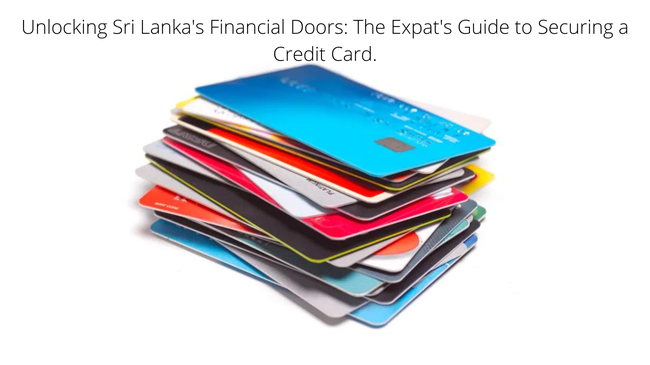Introduction
Sri Lanka, the Pearl of the Indian Ocean, beckons with its tropical allure, rich history, and unique cultural tapestry. But beyond its tea plantations and pristine beaches, lies a financial ecosystem that expatriates might find both intriguing and challenging. Among the frequently asked questions by the expatriate community is: How does one access a credit card in Sri Lanka? This guide takes you on a journey through the nation's financial corridors, shedding light on the avenues and intricacies of obtaining plastic money.
Historical Framework
Sri Lanka's financial and banking architecture is a result of its storied past. From colonial influences to post-independence economic challenges, its system is deeply rooted in history:
Colonial Legacy
The Portuguese, Dutch, and British colonization's left their mark not just culturally but also on the island's financial infrastructure. The British, in particular, introduced the western banking system. The Bank of Ceylon, which remains a significant player today, was established by the British in 1939.
Post-independence Economic Reshaping
Following independence in 1948, Sri Lanka took significant steps to redefine its economy. The establishment of the Central Bank of Sri Lanka in 1950 was a vital move towards solidifying the country's financial autonomy.
1970s' Economic Policies
During the 1970s, policies leaned towards socialism. The banking sector saw major changes, with several significant private banks being nationalized. This period marked the state's deeper involvement in banking operations and services.
1980s' Liberalization and Modern Banking
The 1980s ushered in economic liberalization policies. This decade saw the return of private banks, offering consumers more choices and promoting competition. The new environment catalyzed innovations in banking products and services, paving the way for the introduction of credit cards in the country.
21st Century and Globalization
With the onset of the 21st century, globalization and technological advancements played pivotal roles. Online banking, digital transactions, and the gradual shift towards a cashless society started taking shape. International banks found footing in Sri Lanka, further diversifying the financial sector and offering a more extensive array of services to both locals and expatriates.
This evolving framework has shaped Sri Lanka's financial sector into a fusion of traditional values and modern practices.
Credit Score - How it works?
In Sri Lanka, the Credit Information Bureau (CRIB) is the primary agency overseeing credit scores. CRIB collates data on borrowing and repayment activities, taking into consideration:
Timeliness of loan and bill payments
Total debt
Duration of credit history
Types of credit availed
Though it primarily focuses on nationals, the system is gradually accommodating the expatriate community's financial behaviors.
Access to a Credit Card Being a Foreigner
While obtaining a credit card as a local is straightforward, expatriates face a few additional steps:
Residence Visa
Holding a valid residence visa is paramount.
Employment
Proof of steady employment or a business venture in Sri Lanka can enhance credibility.
Bank Account
It's advisable to maintain an account with the bank from which you seek a credit card.
Documentation
Passport, visa, employment details, local bank statements, and sometimes even credit reports from the expat's home country.
Security Deposit
Some banks may require a fixed deposit as collateral.
Advantages
Convenience
Seamless transactions, especially beneficial for those who travel frequently within the country.
Rewards and Offers
Many Sri Lankan banks offer attractive reward points and deals.
Disadvantages
Higher Interest Rates
Expatriates might encounter higher rates than locals.
Limited Credit Limits
Initially, banks might offer lower credit limits to foreigners.
Currency Fluctuation
For those who earn in a different currency, the fluctuating exchange rate can impact repayments.
Trends and Patterns
Digital Integration
More banks are integrating mobile apps and online platforms for easier card management.
Tourist Cards
Some institutions are exploring credit cards tailored specifically for long-stay tourists or expatriates.
Tips
Always be updated with the latest exchange rates.
Pay off outstanding amounts timely to avoid high interest.
Utilize mobile apps for real-time transaction alerts.
Curiosities
Sri Lanka was one of the first countries in South Asia to introduce credit cards, back in the 1980s.
Certain banks offer "dual currency" cards, suitable for those transacting both locally and internationally.
Conclusion
Embarking on the credit journey in Sri Lanka as an expatriate blends a mix of understanding local financial nuances and adhering to global best practices. While challenges exist, with diligence and a clear understanding, the path to obtaining that coveted plastic companion becomes less daunting. As Sri Lanka integrates further into the global financial fabric, expatriates can look forward to even more streamlined processes in the future.

